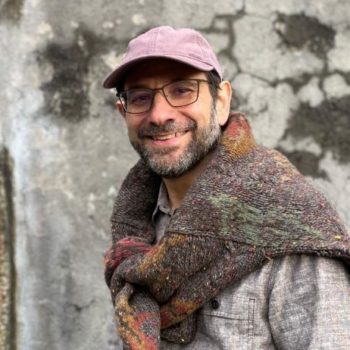In Pirkei Avot, a book of maxims in the Mishnah, an ancient rabbi, Ben Bag-Bag said about Torah study, “Hafokh bah, va’Hafokh vah, d’khola bah.” Turn it over and over, for everything is in it. For two thousand years, that’s what Jews have done. Here is another turning.
In Pirkei Avot, a book of maxims in the Mishnah, an ancient rabbi, Ben Bag-Bag said about Torah study, “Hafokh bah, va’Hafokh vah, d’khola bah.” Turn it over and over, for everything is in it. For two thousand years, that’s what Jews have done. Here is another turning.
In Pirkei Avot, a book of maxims in the Mishnah, an ancient rabbi, Ben Bag-Bag said about Torah study, “Hafokh bah, va’Hafokh vah, d’khola bah.” Turn it over and over, for everything is in it. For two thousand years, that’s what Jews have done. Here is another turning.
In Pirkei Avot, a book of maxims in the Mishnah, an ancient rabbi, Ben Bag-Bag said about Torah study, “Hafokh bah, va’Hafokh vah, d’khola bah.” Turn it over and over, for everything is in it. For two thousand years, that’s what Jews have done. Here is another turning.
Before the global pandemic, most people in developed nations didn’t think much about plagues. Clean water, sewage infrastructure, refrigeration, and decent basic medical care ensured that the scourges of the Bible and Middle Ages seemed like a distant memory. Because of that, the extended passages in Leviticus about Biblical leprosy often struck a modern reader as antiquated, bizarre, or completely irrelevant. We now recognize that humanity may never escape periodic plagues
Before the global pandemic, most people in developed nations didn’t think much about plagues. Clean water, sewage infrastructure, refrigeration, and decent basic medical care ensured that the scourges of the Bible and Middle Ages seemed like a distant memory. Because of that, the extended passages in Leviticus about Biblical leprosy often struck a modern reader as antiquated, bizarre, or completely irrelevant. We now recognize that humanity may never escape periodic plagues
Before the global pandemic, most people in developed nations didn’t think much about plagues. Clean water, sewage infrastructure, refrigeration, and decent basic medical care ensured that the scourges of the Bible and Middle Ages seemed like a distant memory. Because of that, the extended passages in Leviticus about Biblical leprosy often struck a modern reader as antiquated, bizarre, or completely irrelevant. We now recognize that humanity may never escape periodic plagues




